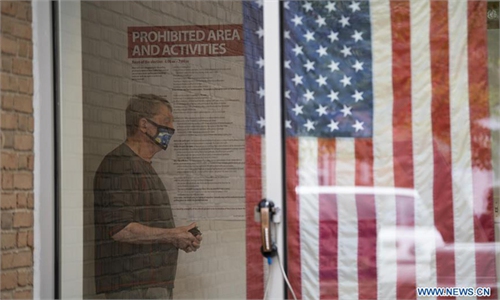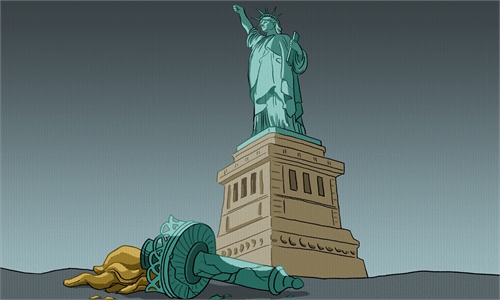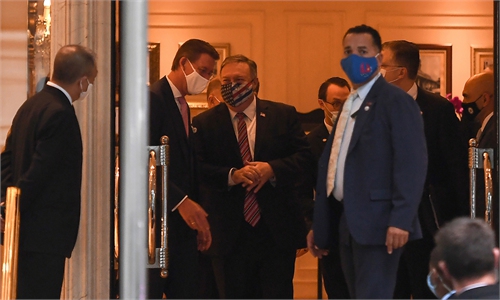Whether he returns to power or not, the US president and his ilk have ruined America and curdled how such privilege is viewed.
And the rest of the world waits with them.
Like many non-Americans, I have been consumed by what is happening in that country and closely followed first the race for the Democratic presidential nomination and then the campaigns of the final two candidates, Donald Trump and Joe Biden.
Trump must be defeated but, sadly, too many Americans, the so-called Republicans and conservatives, remain steadfast to him, having fallen for his fabrications and misinformation on just about everything, which proves that if a lie is repeated often enough, people will believe it.
Still, we hope enough right-minded Americans will vote him out and from the huge, record-breaking numbers of early voters, it appears they are determined to save their nation from further damage by this narcissistic, corrupt and immoral president.
How strange that America today feels like Malaysia circa 2018. The desperation and the grassroots movements to oust Trump recall Malaysians’ own struggle and determination to change things in the last general election.
Trump has become the unsavoury poster boy for white supremacists who believe white privilege is their God-given right.
I used to look up to the white man. As a baby boomer, my generation studied British, American and European history and practically nothing of the past of neighbouring countries. Communism was our great enemy in the 1960s and 1970s which was probably why we were barely taught Chinese history.
Western entertainment dominated our TV and cinema screens, our radio stations and record stores. Our idols were white singers and actors. The only black actor we knew was Sidney Poitier.
And so my generation grew up subconsciously believing that white people were superior and their way of life desirable.
As colonial masters of many parts of Africa and Asia, the whites came to lift the brown and yellow natives from backwardness and ignorance for God and king. Or so they projected themselves.
Western colonialism was pure exploitation for the most part but it was tempered by genuinely good-hearted people who came as teachers and missionaries (a prime example is how Australian missionaries saved the Lun Bawang orang asal in Sarawak from self-destruction in the 1930s).
We so-called people of colour put the so-called whites on pedestals, treating them with deference and respect. We didn’t put a name to it then but now it’s widely referred to as white privilege.
While white privilege in the United States is greatly manifested as racism and extreme prejudice and ill-treatment of black and, increasingly, Hispanic people, in other parts of the non-white world, it was simply the vestigial awe and deference left over from the colonial era and dominance of the West in the previous century.
For example, a common complaint a decade or two ago was how white passengers on Asian airlines were treated better than other races.
My own pedestal on which I had placed white people only started to wobble during my first trip to Britain in the early 1980s when I saw, to my huge surprise, white people who were homeless or doing menial tasks like sweeping the streets of London.
But by the late 1970s, change was coming from the East, namely Japan. Among Asians, the Japanese were the closest to the whites in terms of progress and wealth. What’s more, they were (and still are) so polite!
The Japanese, who had built a reputation for quality electrical products and cars, were also gaining world attention as sought-after tourists and art collectors with great spending power.
A friend who travels extensively recalls how people in Africa would greet Asian-looking people with “Konnichiwa” in the 1980s and 1990s.
Two decades into the 21st century, white influence has been steadily eroded by East Asia.
The Japanese may have started it but they are now joined, and somewhat eclipsed, by the Chinese and South Koreans.
My well-travelled friend tells me Africans now greet East Asians with “Ni hao” which is not surprising since Chinese tourists made 149 million overseas trips in 2018, with total spending amounting to US$130bil (RM540.4bil).
Many countries in Africa and Asia are China-friendly, not just because of tourism but because Beijing has been investing in them for decades.
In an op-ed for Aljazeera.com titled, Why Africa loves China, Dr Mehari Taddele Maru argues that, contrary to what the West believes, Africans do not see themselves as victims of Chinese economic exploitation. He says Africans are well aware of the shortcomings of Chinese assistance and business in Africa but it is China that is a preferred partner for Africa because “China’s unconditional cooperation has allowed African governments to enjoy access to finance, expertise and development aid”.
The China Africa Research Initiative at the Johns Hopkins University School of Advanced International Studies, also reports that despite Western governments’ claims that China’s lending to Africa was creating debt threats, it did “not see China attempting to take advantage of countries in debt distress”.
“There were no ‘asset seizures’ in the 16 restructuring cases that we found. We have not yet seen cases in Africa where Chinese banks or companies have sued sovereign governments or exercised the option for international arbitration standard in Chinese loan contracts, ” the study noted.
And then there is South Korea which has become a driving force with its technological prowess and tremendously influential K-pop culture.
Its goods, from cars and washing machines to mobile phones, are widely accepted as affordable yet high-quality products.
Seoul’s effective handling of the Covid-19 pandemic won global respect and even its coronavirus test kits and personal protective equipment are deemed to be more reliable and of higher quality.
Both China and South Korea have learned from Hollywood the massive influence of soft power, that is, the use of popular culture and entertainment to build their brand and fuel national pride.
If America gave us Armageddon, Saving Private Ryan and Sully: The Miracle on the Hudson, China now has The Wandering Earth, The Eight Hundred and The Captain (which is also based on a real incident involving Sichuan Airlines Flight 8633).
And as I have written several times, K-pop culture has won millions of devotees around the world, and the fan clubs, especially that of the group BTS, have proven to be a force to be reckoned with.
Trump himself is a major contributor to the rapid erosion of respect for white America. He is the ugliest face of white racism, privilege and entitlement. With his egging, his supporters show how stupid, ill-informed and racist they really are in their response to the pandemic and many other issues and that has reflected so badly on the nation itself.
Asians could only shake our heads in amazement at how Americans and people in Europe and Australia fought against wearing masks to reduce Covid-19 infections in the name of human rights and democracy. How daft is that?
Make no mistake: I still have much affection, admiration and gratitude for the Western books, movies, music and other educational and entertainment fodder I grew up with and that helped shape me into what I am today.
So too the many inventions and technologies that have made our lives easier, safer and more convenient.
But I am no longer in thrall of the two Ws – Western and white.
White people may have ruled the world in the previous century and claimed their white privilege. But no more.
No matter how hard he has tried to denigrate and blame China for America’s ills and woes, Trump and his ilk cannot stop white privilege and supremacy in the 21st century from slowly but surely turning yellow. Still, I prefer not to call it yellow privilege because Asians are generally more humble. Shall we just say yellow is the new black?
The views expressed here are entirely the writer’s own.
Related
Related posts
Time to stop bullying... China has no reason to fear US suppression, the Korea War 1950~53 The Chinese People's Vo.
Pompeo is poison that Asian countries should guard against: Lying not to make America 'great again'



















